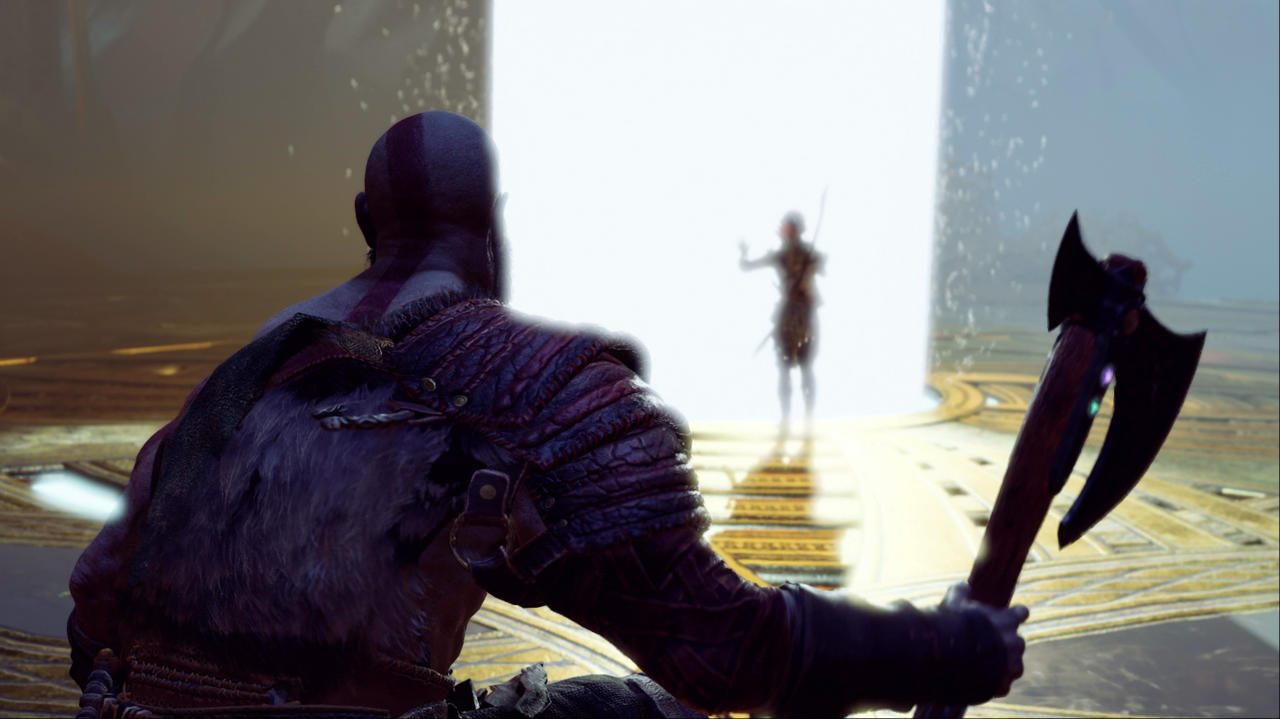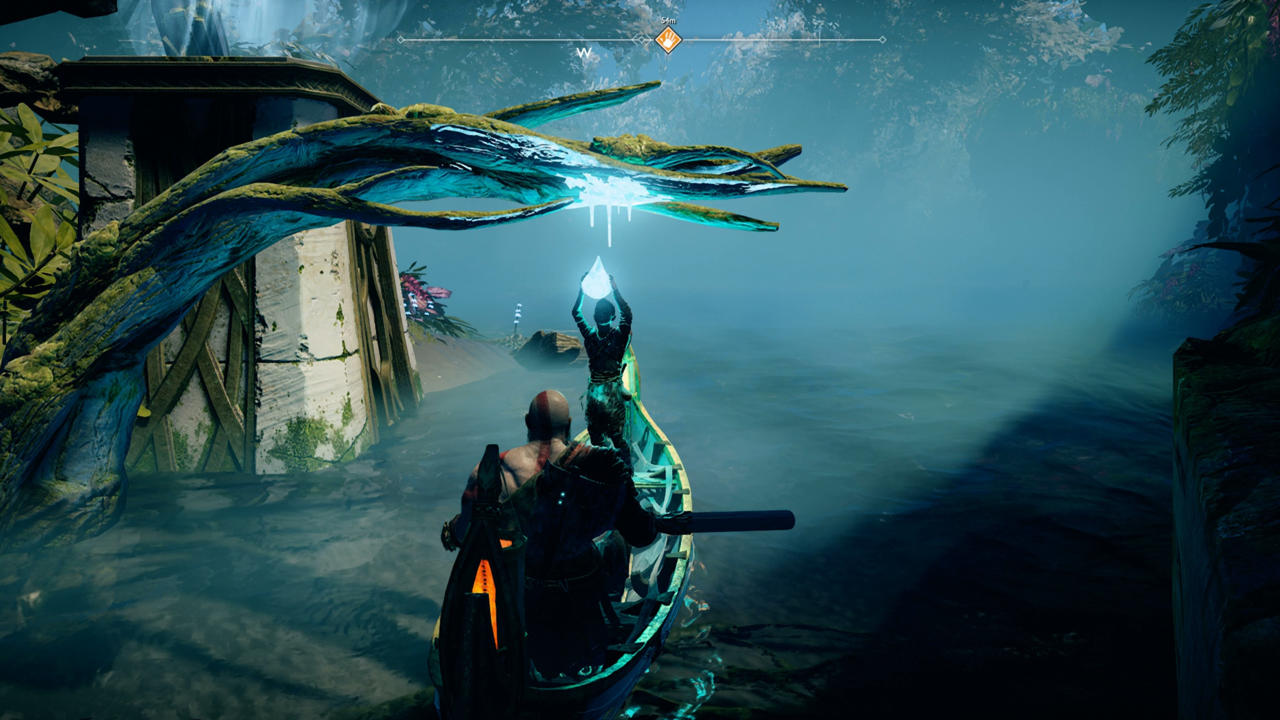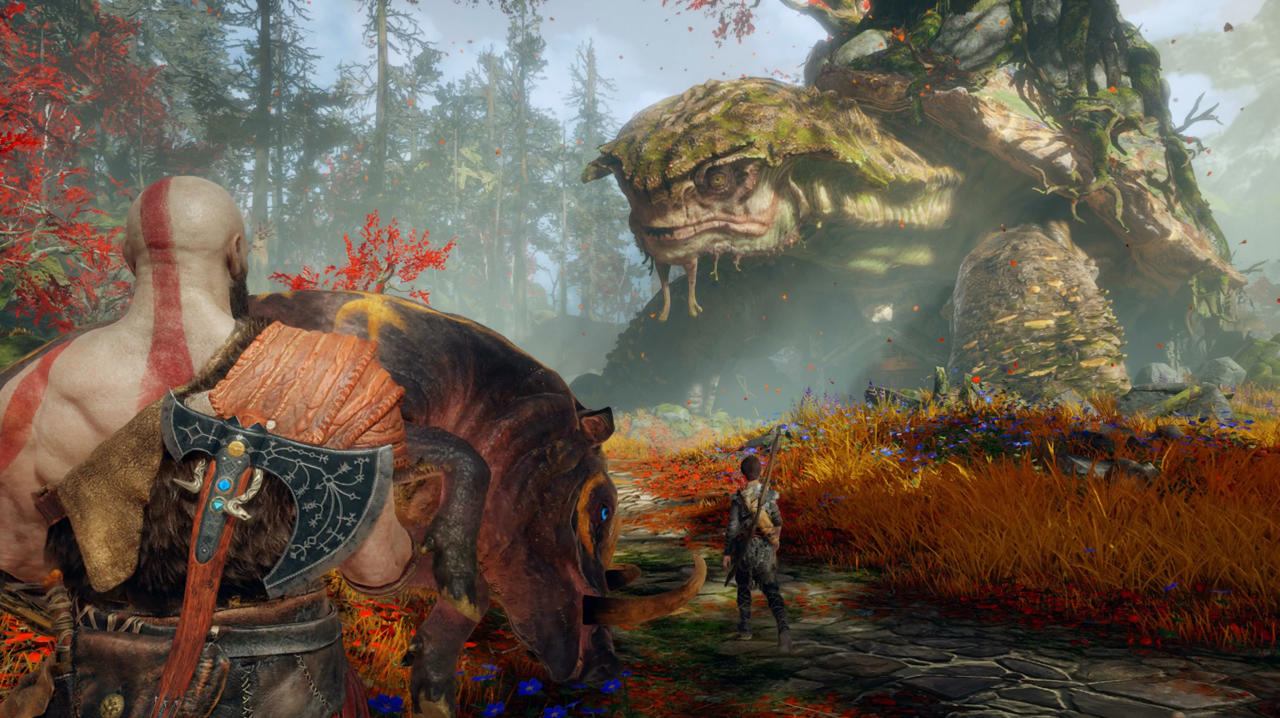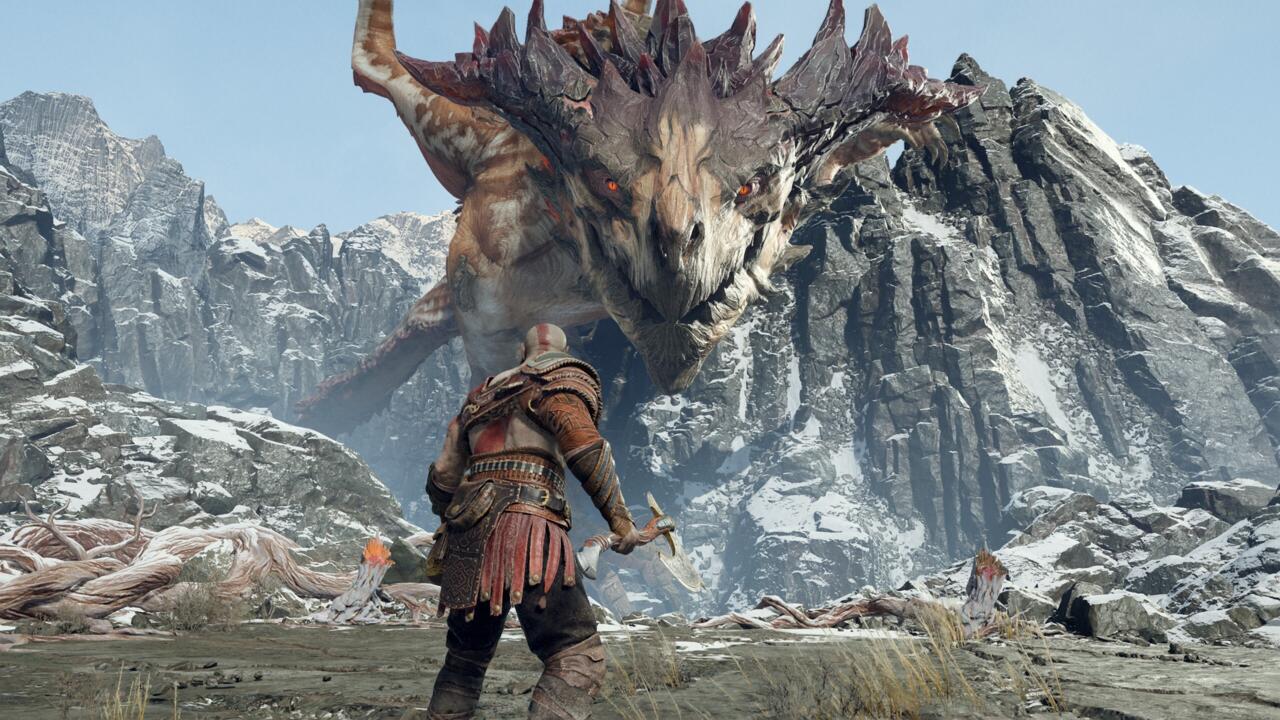This review has been updated to include impressions of God of War's PC version, released in 2022. The initial review, written by Peter Brown in 2018, follows. The new text, written by Phil Hornshaw in 2022, has been added at the bottom of the original review.
The God of War series has, until now, stuck very close to the standards set in the original 2005 game. More than a decade (and many games) later, it makes sense that Sony would want to mix things up for the aged hack-and-slash series. Like so many popular franchises that have reinvented themselves in recent years, the new God of War dips into the well of open-world RPG tropes. It also shifts its focus to Norse mythology, casting off the iconic Greek gods and legends that provided the basis for every previous game.
These major shifts don't signal the end of God of War as we know it, rather they allow the series' DNA to express itself in new ways. There are many reasons why the structural transformations are a good thing, but it's what's become of Kratos, the hulking death machine, that leaves a lasting impression. A furious, bloodthirsty icon has transformed into a sensitive father figure. Part of him retains the old violent tendencies that made him a star long ago. However, with his young son Atreus to protect and guide, we also see Kratos take a deep breath and bury his savage instincts in order to set a positive example.
Watching Kratos take care in nurturing his child's sensibilities does feel a bit jarring at the start, but thanks to the natural writing, fitting voice actors, and flawless animation, it's easy to get sucked into the duo's journey and buy into their mutual growth. Though he is a teacher, Kratos carries a mountain of grief and self-pity that only the innocence of his son can help him overcome. And Atreus experiences his own ups and downs that might have set him down a very different path if not for Kratos' guiding hand.

Atreus was raised in isolation from the dangers of the wild world around him, and rightfully fails to grasp his place in it when confronted with the realities of a land protected by and under siege from gods. It's the death of his mother prior to the start of the game that thrusts Atreus and Kratos outward; her dying wish was to have her ashes spread atop the highest peak in the land. As if wild predators and ghastly fiends weren't obstacles enough, representatives from the pantheon of Norse mythology arise in an attempt to disrupt their mission, establishing the amplified stakes and the clash of impressive forces that you expect from God of War.
And like its predecessors, God of War is a technical and artistic showcase. It is without a doubt one of the best-looking console games ever released, with every breathtaking environment and mythical character exhibiting impressive attention to detail and beautifying flourishes aplenty. The vision behind all of this is evident in Kratos' meticulously grizzled physique and weathered equipment, in the atmospheric effects that transform believably rustic environments into the stuff of dreams, and in the overall design and structure of the world itself.
The majority of the journey is set in the realm of Midgard. At its heart lies a wide lake that you can explore by canoe, with a coastline dotted by optional puzzles, formidable opponents, and entrances to the map's primary regions. Your mission will carry you through to most of these places, and along the way you'll likely take note of inaccessible pathways and glimpses of sealed treasures. There's always ample room to explore off the main path and good reasons to give into curiosity regardless, but these teases in particular spur you to re-examine previously visited areas as your capabilities expand.
With the boy fighting by your side, firing arrows or choking unsuspecting enemies, you will team up against corrupted cave trolls, face towering beasts, and fight hundreds of intelligent supernatural warriors during your travels. Kratos prefers to use an axe these days, which functions very differently than the chained Blades of Chaos he's known for. This comes with the very satisfying and cool ability to magically summon your weapon to your hand (like Thor and his hammer), a move that never gets old.
And really, neither does combat in general. The new over-the-shoulder camera brings you directly into the fray, and consequently limits your view. You can't see enemies from all angles at once and must be on guard at all times. By default the game provides proximity icons to alert you of incoming attacks, but it's worth tinkering with the UI for a more immersive experience as you get the hang of how fights flow.
It's rare that you can actually spam combos without putting yourself at risk, and this emphasis on mindfulness solidifies God of War's graduation from the traditional hack-and-slash doldrums. The realities of fighting with an axe also makes skirting away from harm an exacting process. But when variables align and you get to lay into an enemy, Kratos' dexterous axe handling allow him to hit hard, and give you the opportunity to flex his might with a bit of style.
The basic set of close-range combos and weapon behaviors can be expanded by pouring experience points into a skill tree and by activating magical rune abilities that bind to your two attack inputs. There are a lot of options to consider and tactics to learn, including skill trees for fighting empty-handed. There's a wonderful rhythm to be found when switching from axe to fists, and then into Kratos' satisfyingly brutal execution moves, all the while ducking and rolling out of harm's way.
God of War's combat is already great at the start, but it gets better as it steadily introduces one new layer after another. You can absolutely stumble into incredibly punishing enemies that are made easier with adept timing and mastery of every available skill, but you can also succeed at any level so long as you've mastered the art of parrying and dodging incoming attacks.

Atreus can't be configured to the same extent that Kratos can, but there are still a lot of ways to tailor his capabilities to your liking. The arrows he fires can be laced with different types of magic, with multiple elemental and functionality upgrades, and he eventually gains the ability to summon spectral animals that can harm and distract enemies, or collect items. Thanks to the smart button layout, it's actually very easy to both attack and defend as Kratos while also commanding Atreus. God of War gives you plenty to do in any given moment and makes you feel like an experienced warrior in the process.
The armor that Kratos and Atreus wear can influence a range of character stats, elemental affinities, and may include slots for enchantments that grant further bonuses. Armor can be purchased or crafted using the few resources scattered about the world, and can be upgraded by the game's two blacksmiths: two dwarven brothers constantly at odds with each other. There's Brok, the foul-mouthed blue dwarf, and Sindri, a far more gentle yet tragically germophobic fellow--a gag that is usually funny, though occasionally pushed a bit too hard.
As enjoyable as those two can be, it's Mimir that ultimately steals the show. The horned, one-eyed sage accompanies you and Atreus for the majority of the game, serving as your guide to Midgard, and an inside source into the ins and outs of Norse politics. Mimir and the blacksmiths have strong individual personalities, as with every other character you meet during the course of the game. We're keeping other identities vague in general to avoid spoilers, but regardless of who you bump into, God of War's cast is strong, convincing, and oddly enchanting. But the real accomplishment is how, even though there are just a handful of characters to interact with, their big personalities color your adventure with tantalizing anecdotes that draw you into the world and imbue the land with a tangible sense of history.
If there's any piece of the overarching mission that feels like a letdown, it's the final battle against the primary antagonist. He's great from a narrative standpoint, unraveling in a manner that changes your perspective, but it's the fight itself that leaves you wanting. There are plenty of big boss battles and tests of skill throughout the course of the game, yet this fight doesn't reach the same heights, and feels like it was played a little safe. It could be an effect of configuring Kratos and Atreus just so, or it may just be too easy to begin with. Thankfully, that's not all the game has up its sleeve.

Two optional areas in particular seem designed with the endgame in mind. The first, Muspelheim, offers a series of battles in arenas surrounded by lava flows and scorched earth. Some trials are merely fights against strong enemies, while others require you to defeat waves in quick succession--if even one enemy remains alive, it only takes a few seconds for others to resurrect automatically. The other realm, Niflheim, is randomly generated every time you visit, but it's always filled with poisonous gas. The goal there is to survive for as long as possible while racking up kills and collecting treasure, and escape before the poison takes hold. Both locations offer tense and rewarding pursuits that are only accessible if you play at your best.
And odds are that you'll be so hooked by the story's pacing and procession of events that there will be plenty of other side activities left in Midgard after the credits roll. God of War isn't set in a massive open world, but it is stuffed with secrets and quests. Where most games with long and diverse quest opportunities tend to run a bit stale by the end, God of War has the opposite effect. It's far longer than it needs to be, though you hope you never run out of things to do.
In many ways God of War is what the series has always been. It's a spectacular action game with epic set pieces, big-budget production values, and hard-hitting combat that grows more feverish and impressive as you progress. What may surprise you is how mature its storytelling has become. Like Kratos, God of War recalls the past while acknowledging the need to improve. Everything new it does is for the better, and everything it holds onto benefits as a result. Kratos is no longer a predictable brute. God of War is no longer an old-fashioned action series. With this reboot, it confidently walks a new path that will hopefully lead to more exciting adventures to come.
God of War PC release
Nearly four years after its initial release, God of War has finally made its way to PC. If you haven't yet checked out Sony Santa Monica's lengthy tale of Mad Dad Kratos and Boy, the PC version is the one you should grab. It doesn't bring any new content to the table, but it does offer graphical options that make an already beautiful game look even better.
The PC version of God of War supports 4k resolution and unlocked framerates, DLSS and ultrawide displays, as well as some more granular options for tweaking the look of the game, like turning up the resolution of textures or enhancing the appearance of shadows. Probably the most notable improvement is the unlocked framerate, which makes for some buttery smooth moments of Kratos slamming the Leviathan Axe into draugr and trolls. God of War ran at 30fps on PlayStation 4, so if this is your first time playing or revisiting the game since then (without, say, the upgrade to its PlayStation 5 version), the higher framerate is a nice step forward for a game that's all about slick animations and the flow state of building devastating combos. Generally, though, God of War was a very pretty game even in its PS4 incarnation, and it remains a very pretty game here, whether you're turning up the graphics and framerate or not.

Apart from the amped-up graphical capabilities, the other main upgrade in the PC version is customization. You can do a lot to mess with the game's graphics, heads-up display, and camera controls to make God of War play the way you want. Like other PC games, God of War also supports a variety of control setups--while PlayStation players are limited to using the DualShock or DualSense, you're not locked into those on PC. I played almost exclusively with an Xbox gamepad, and it felt just as natural as if the game had been made to play on the platform from the start. While you can't remap gamepad controls, everything can be customized if you're playing with a mouse and keyboard for even more opportunities to adjust how the game feels.
God of War isn't drastically different on PC when compared to the PS4 version that launched back in 2018, but its little improvements are definitely nice ones, making this a solid PC port overall. There isn't reason enough here to buy a second copy of the game if you've already played, necessarily, but the PC version is a great reason to check out God of War for the first time for anybody who hasn't had a chance to experience it. God of War remains an excellent, gorgeous, affecting action game, and with the port to PC, it gets a handful of nice, if somewhat minor, improvements.
God Of War is featured as one of the best PS5 games.



















